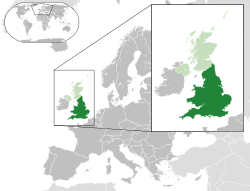Law Commission (England and Wales)
| Comisiwm y Gyfraith | |
|
Law Commission logo | |
|
England and Wales within the UK and Europe | |
| Established | 1965 |
|---|---|
| Type | Advisory non-departmental public body sponsored by the Ministry of Justice |
| Legal status | Created by the Law Commissions Act 1965 |
| Purpose | To keep the law of England and Wales under review and to recommend reform where needed |
| Headquarters | 52 Queen Anne’s Gate, London SW1H 9AG |
| Coordinates | 51°30′01″N 0°08′03″W / 51.5003°N 0.1341°WCoordinates: 51°30′01″N 0°08′03″W / 51.5003°N 0.1341°W |
Region served | England and Wales |
Official languages | English and Welsh |
Chairman | Lord Justice Bean |
Chief Executive | Phil Golding |
| Slogan | "Reforming the law" |
| Website |
www |
In England and Wales the Law Commission (Welsh: Comisiwm y Gyfraith) is an independent body set up by Parliament by the Law Commissions Act 1965[1] to keep the law of England and Wales under review and to recommend reforms. The organisation is headed by a Chairman (currently Sir David Bean, a judge of the Court of Appeal) and four Law Commissioners. It proposes changes to the law that will make the law simpler, more accessible, fairer, modern and more cost-effective. It consults widely on its proposals and in the light of the responses to public consultation, it presents recommendations to the UK Parliament that, if legislated upon, would implement its law reform recommendations.
Activities
In presenting its proposals, the Law Commission chooses an area of law to review after seeking the views of interested parties and taking into account whether it has the resources to do a thorough job of researching and reviewing the current law and producing recommendations that will receive the broadest possible measure of official and public acceptance. At any one time, around 15 to 20 areas of law will be under review. Law Commission projects cover a wide range of subjects that belong to the criminal law, property law, family and trust law, public law, commercial law and many other areas from time to time.
The Law Commission has a rolling programme of law reform projects, and every three years or so it consults on any new projects that should be added to the list of those that it already has under way. Consultations are due to begin on what should be included in the next programme, which will be the Commission’s twelfth programme since it was set up. When agreed, the twelfth programme will commence in 2014.
Approximately 67% of the Law Commission’s law reform recommendations have been enacted. A further 4% have been accepted by Government but not yet enacted, and 5% are awaiting a response from Government.
Current Commissioners
The current commissioners are as follows:[2]
- Stephen Lewis
- Professor David Ormerod QC
- Nicholas Paines QC
- Professor Nicholas Hopkins
Chairs
The chair of the Law Commission is usually a High Court judge. Chairs are promoted to the Court of Appeal. Until 2008, promotion would occur soon after or shortly before the end of their term as chair, with one exception: Mr Justice Cooke (whose term as chair ended with his death in 1978).[3] Mr Justice Etherton was promoted to the Court of Appeal approximately two years into his term. The most recent incumbents were appointed near the beginning of their terms.[4]
- Leslie Scarman (1965–1973)
- Samuel Cooke (1973–1978)[3]
- Michael Kerr (1978–1981)[5]
- Ralph Gibson (1981–1985)[6]
- Roy Beldam (1985–1989)[7]
- Peter Gibson (1990–1992)[8]
- Henry Brooke (1993–1995)[9]
- Mary Arden (1996–1999)
- Robert Carnwath (1999–2002)[10]
- Roger Toulson (2002–2006)[11]
- Terence Etherton (2006–2009)[12]
- James Munby (2009–2012)[13]
- David Lloyd Jones (2012–2015)[14]
- David Bean (2015–present)[15]
See also
References
- ↑ Text of Law Commission Act 1965.
- ↑ "Who we are | Law Commission". Retrieved 2 October 2015.
- 1 2 Professor Graham Zellick; Francis Bennion (14 May 1986). "The Legislative Implementation of Law Reform Proposals" (PDF). Law Commission - QMC Colloquium. F A R Bennion. Retrieved 13 May 2009.
- ↑ "Senior Judiciary". Judiciary of England and Wales. Archived from the original on 27 July 2012. Retrieved 21 August 2012.
- ↑ "Obituary - Sir Michael Kerr". The Daily Telegraph. London. 23 April 2002. Retrieved 14 April 2009.
- ↑ "Obituary - Sir Ralph Gibson". The Daily Telegraph. London. 5 November 2003. Retrieved 13 May 2009.
- ↑ "Roy Beldam". Crown Office Chambers. Retrieved 13 May 2009.
- ↑ "MI5 - Intelligence Services Commissioner". MI5. Retrieved 13 May 2009.
- ↑ "Sir Henry Brooke". Fountain Court. Retrieved 3 April 2009.
- ↑ "Court of Appeal Civil Division". HM Courts Service. 20 March 2009. Retrieved 3 April 2009.
- ↑ "Honorary Graduates - Sir Roger Toulson, Doctor of Laws". University of Bradford. 7 July 2008. Retrieved 3 April 2009.
- ↑ "Terence Etherton to Chair Law Commission". legalday.com. 25 July 2006. Retrieved 1 April 2009.
- ↑ "New chairman of Law Commission appointed by Lord Chancellor". Ministry of Justice. 3 August 2009. Retrieved 13 August 2009.
- ↑ "Appointment of Lord Justices of Appeal". Number10.gov.uk. 26 July 2012. Retrieved 27 July 2012.
- ↑ "Appointment of Lord Justices of Appeal". lawcom.gov.uk. 27 March 2015. Retrieved 2 October 2015.
External links
- Law Commission website
- ePolitix - Interview with Law Commission chair Roger Toulson - 31 January 2006


.svg.png)